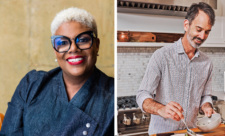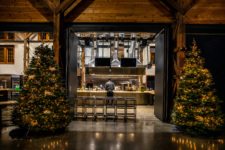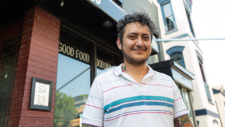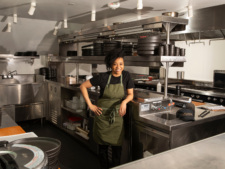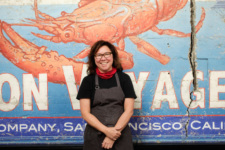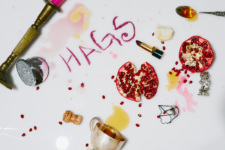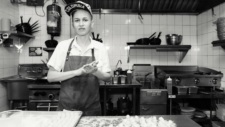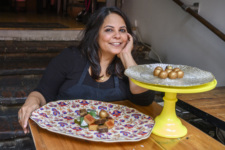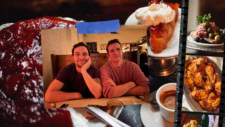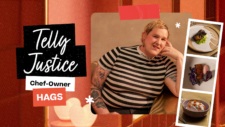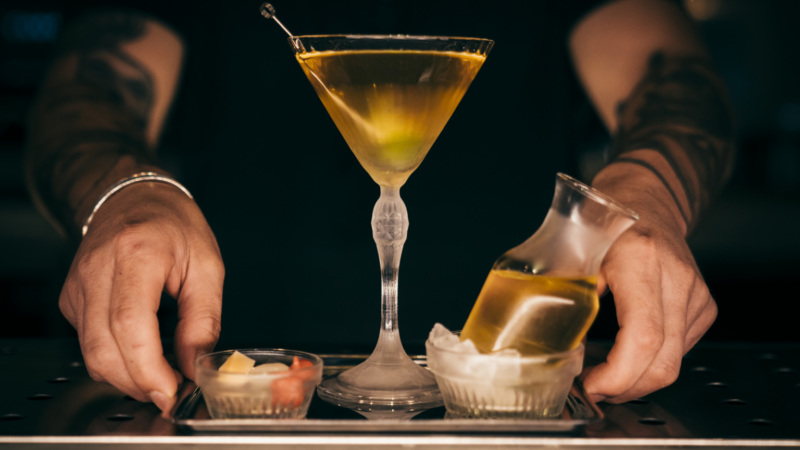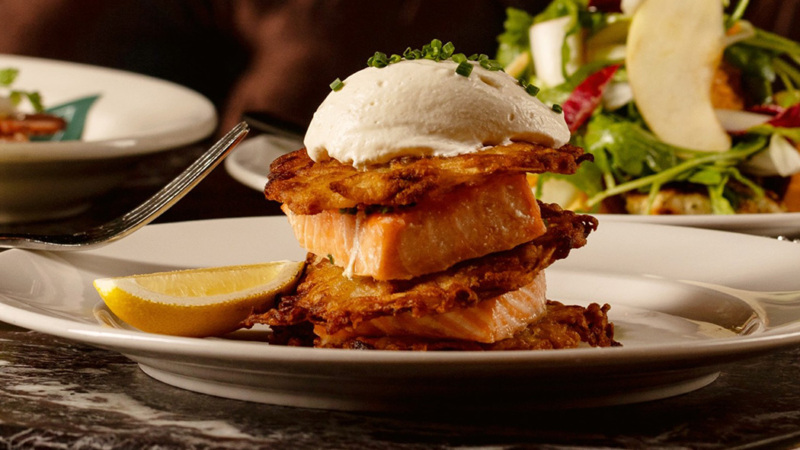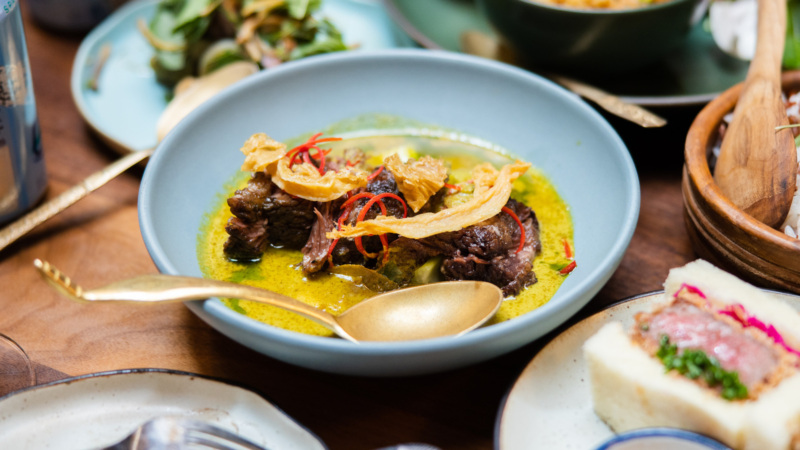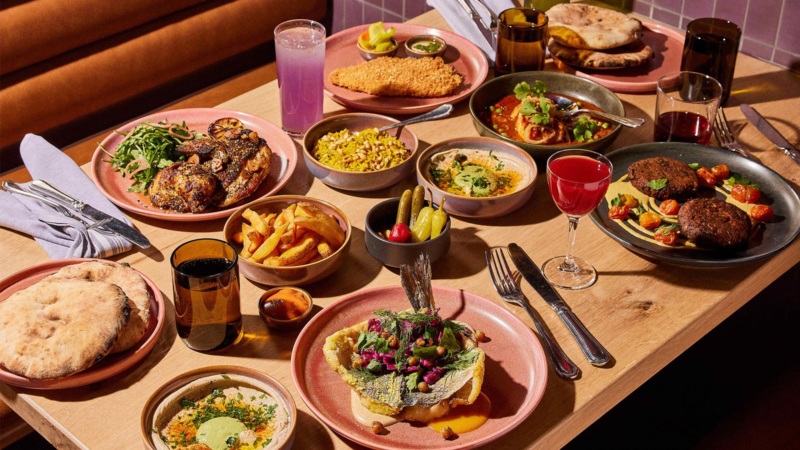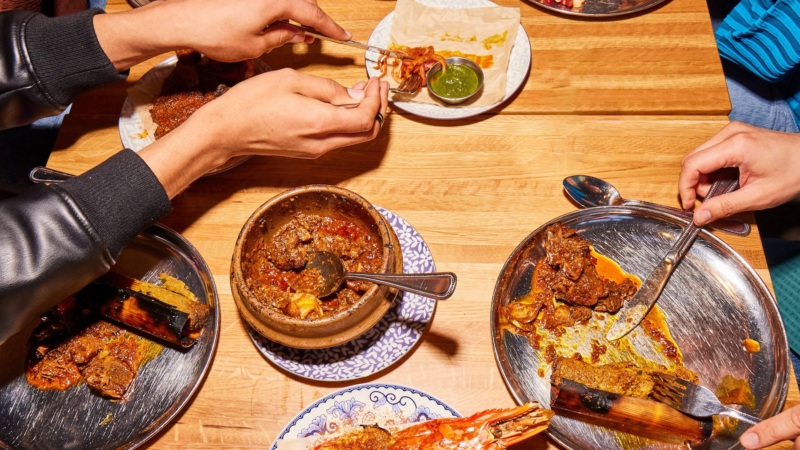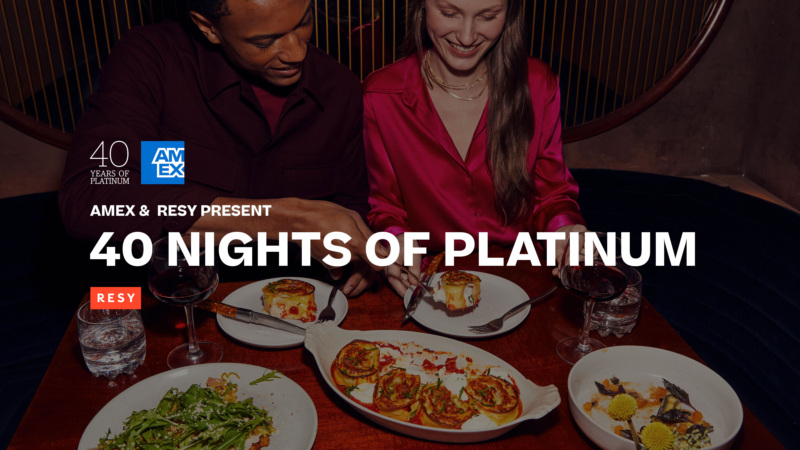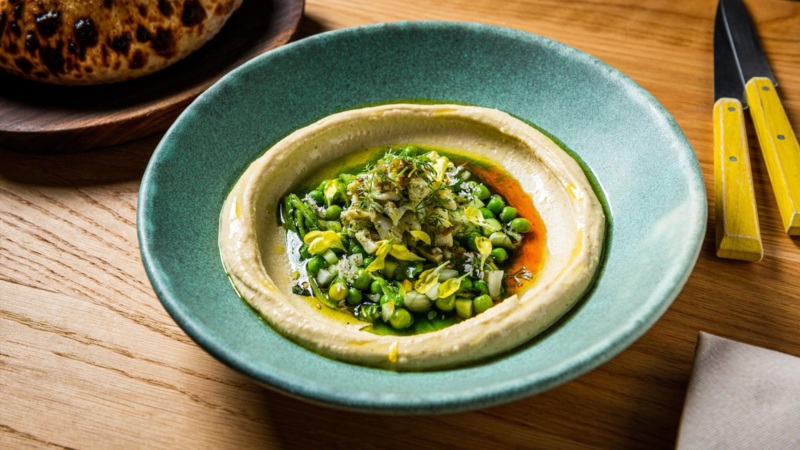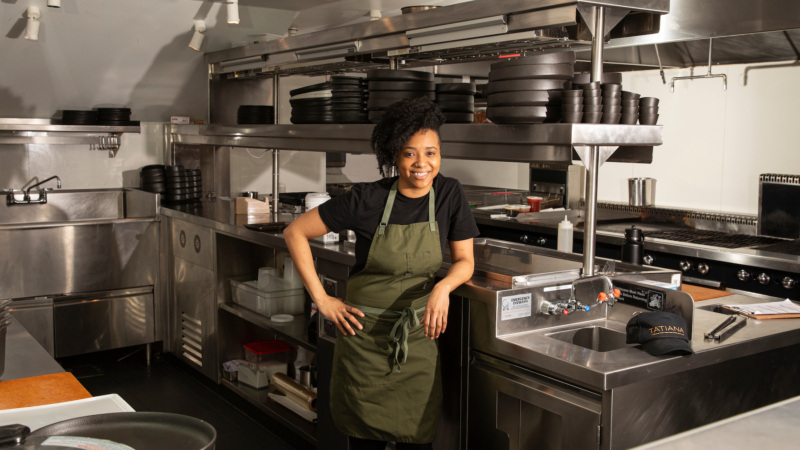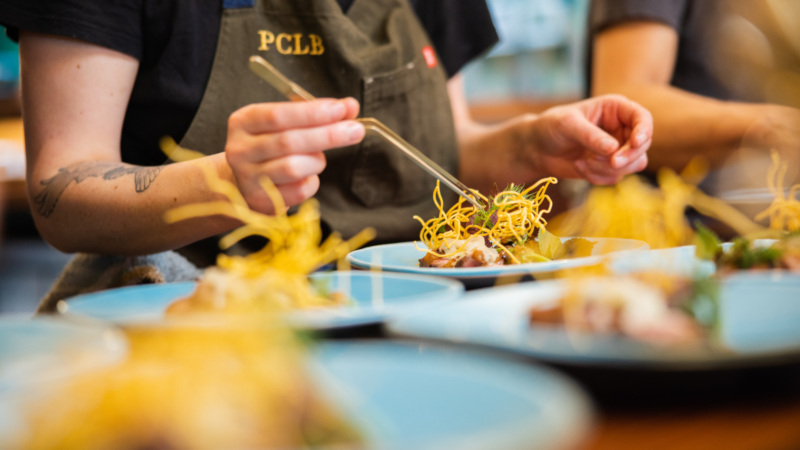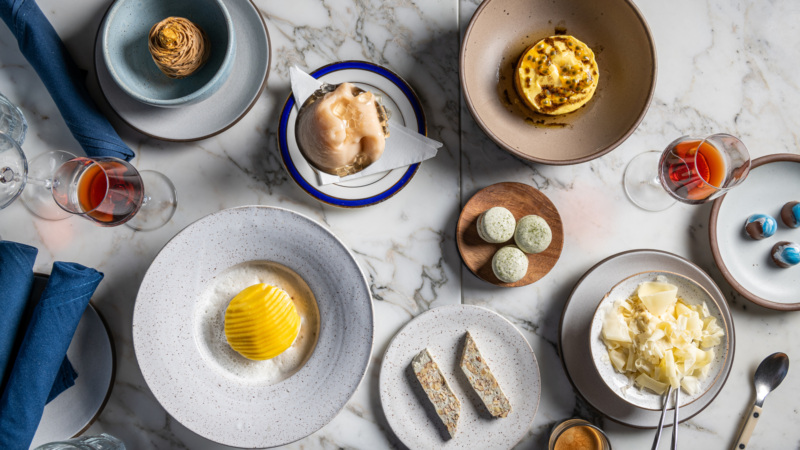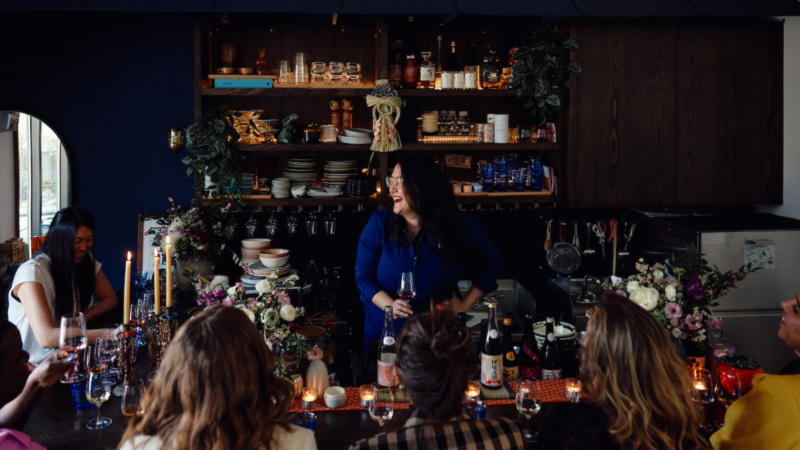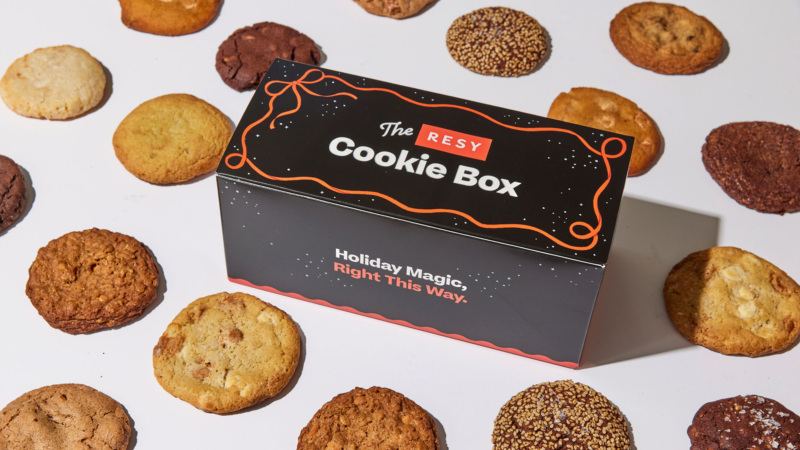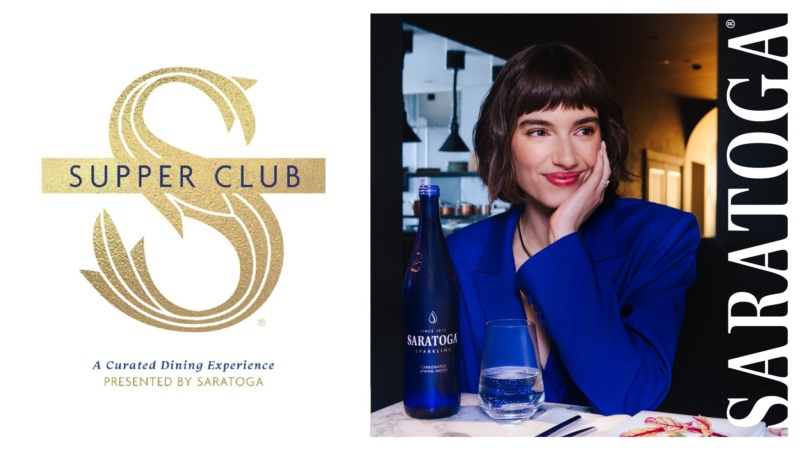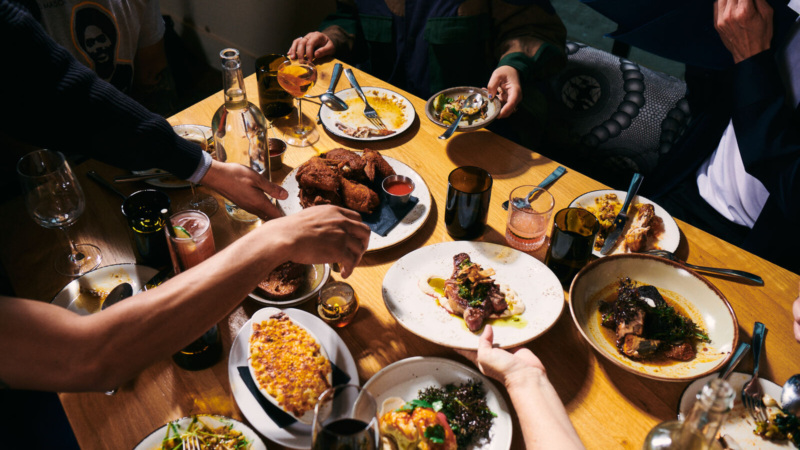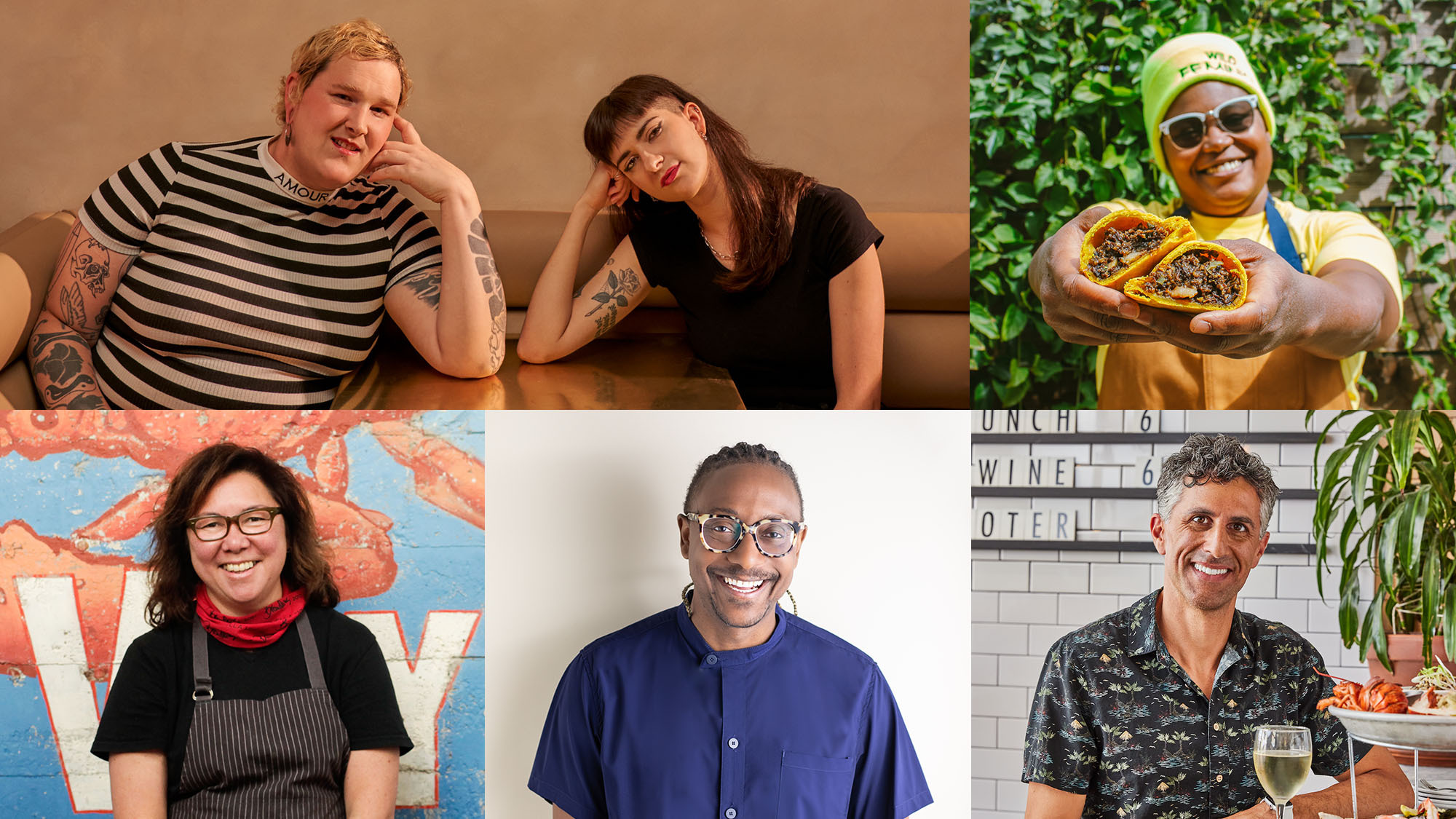
What Pride Means to These Six Chefs and Restaurateurs
What better way to celebrate the vibrant and ever-evolving Queer food community than speaking with six culinary professionals about their unique experiences navigating life, community, and the kitchen?
In this Pride-filled roundtable, we spoke to six chefs and restaurateurs from across the country — Los Angeles’ Rashida Holmes (Bridgetown Roti), Portland’s Gregory Gourdet (Kann), New York’s Telly Justice and Camille Lindsley (HAGS), San Francisco’s Brenda Buenviaje (Brenda’s French Soul Food, Brenda’s Meat & Three, and Brenda’s Oakland), and Philadelphia’s Sam Mink (Oyster House) — about both the progress and challenges that remain within the culinary industry today, and how Pride is ever-present in their lives.
Editor’s Note: Responses have been edited for length and clarity.
Resy: As a member of the LGBTQIA+ community, do you feel that progress has been made in terms of inclusivity and creating safe spaces in your city, especially within the culinary industry? Where do you see opportunities for progress?
Rashida Holmes: I benefit from living in Los Angeles, which has always been at the forefront of progress in terms of making space for the alphabet mafia. [The community] is pretty robust. I can name at least 15 Queer ladies doing amazing things in food in Los Angeles.
It’s one of the reasons why I moved here in 2012. I knew that I could exist in this space freely and be myself. I think that culinary spaces have always been a place where Queer people have found homes, especially when they’ve lost homes or they’ve moved to big cities like L.A. or New York, and found acceptance among the other misfits and in kitchens.
As far as opportunities for progress? The ceiling shows its ugly face when it comes to management, head chefs, and owners; ownership, particularly with POC Queer folks. This is where we haven’t seen enough progress, and that’s where we need to see more, because we are here, and we are really pushing the food conversation forward. So, I’d like to see us own the reins.
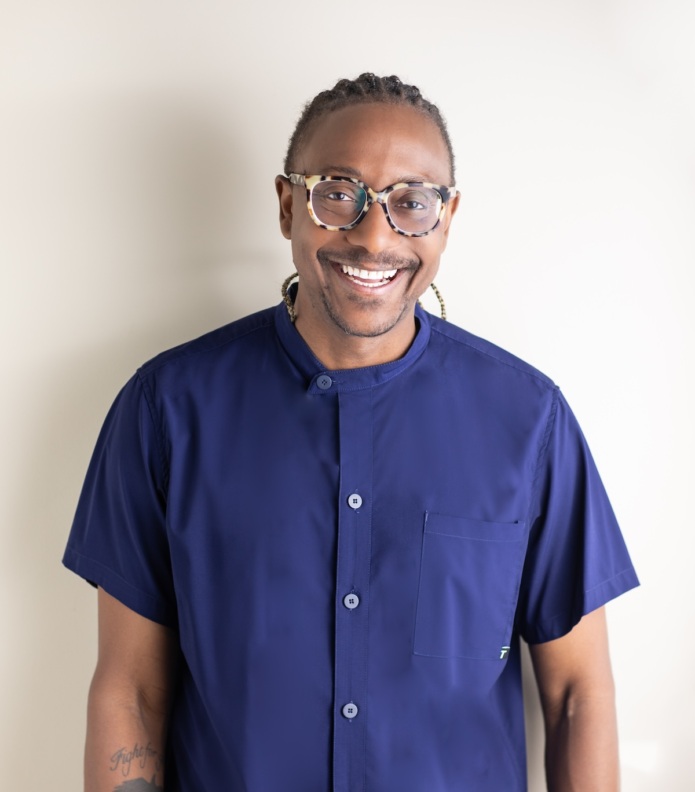
For me, Pride truly means being comfortable in your skin as a Queer person. And not being ashamed of any part of you.— Gregory Gourdet, Chef and Owner, Kann in Portland
Gregory Gourdet: The Queer community in Portland is very strong. We have a lot of Queer-owned businesses, and Queer people in politics that have been instrumental and helpful in getting policies pushed forward. Granted, Portland has a million other problems, but within the Queer community, I think we can proudly serve to stand as an example of how things should and can go.
I’ve worked really hard to create a safe space for my teammates, I don’t ever want anyone’s Queerness to feel like something that is not respected in the workplace. If you look at the bigger landscape of what’s going on in America, there’s still violent attacks against our community. And there’s basically a war on the trans community right now. I feel like we’re slowly inching toward something better. We are at the crux of this civil rights movement for the Queer trans community. I can only hold my ground where I am, and make sure that everyone at Kann feels safe.
I feel we [in the culinary industry] were really hit by the pandemic, in terms of restaurants closing or needing to be rebuilt. And being front and center of the reckoning that happened with social justice, both within communities of color — obviously the Black community — but also within the restaurant industry during that time. So, to be four years out from all of that, it really ignited a lot of discussion and change; I think it’s been important to see representation. Our [Eater Portland] chef of the year last year was a trans chef [Luna Contreras of Chelo]. Our city is doing a decent job at representation, but I definitely feel there’s still a long way to go.
Visibility is extremely important. I feel it’s unfortunate [that] we still have to normalize our existence. Black folk had to normalize their existence and just be like “Hey, we’re just like everybody else, we deserve the same things, we deserve the same human things, and we also deserve the same opportunities for advancement in life.” And I feel that’s where we are now. Emotional intelligence is something that’s really helped me get through, having that as a tool to deal with society is critical. Just offering people in our community the same opportunities for advancement — that’s the most powerful way for us to keep things moving forward.
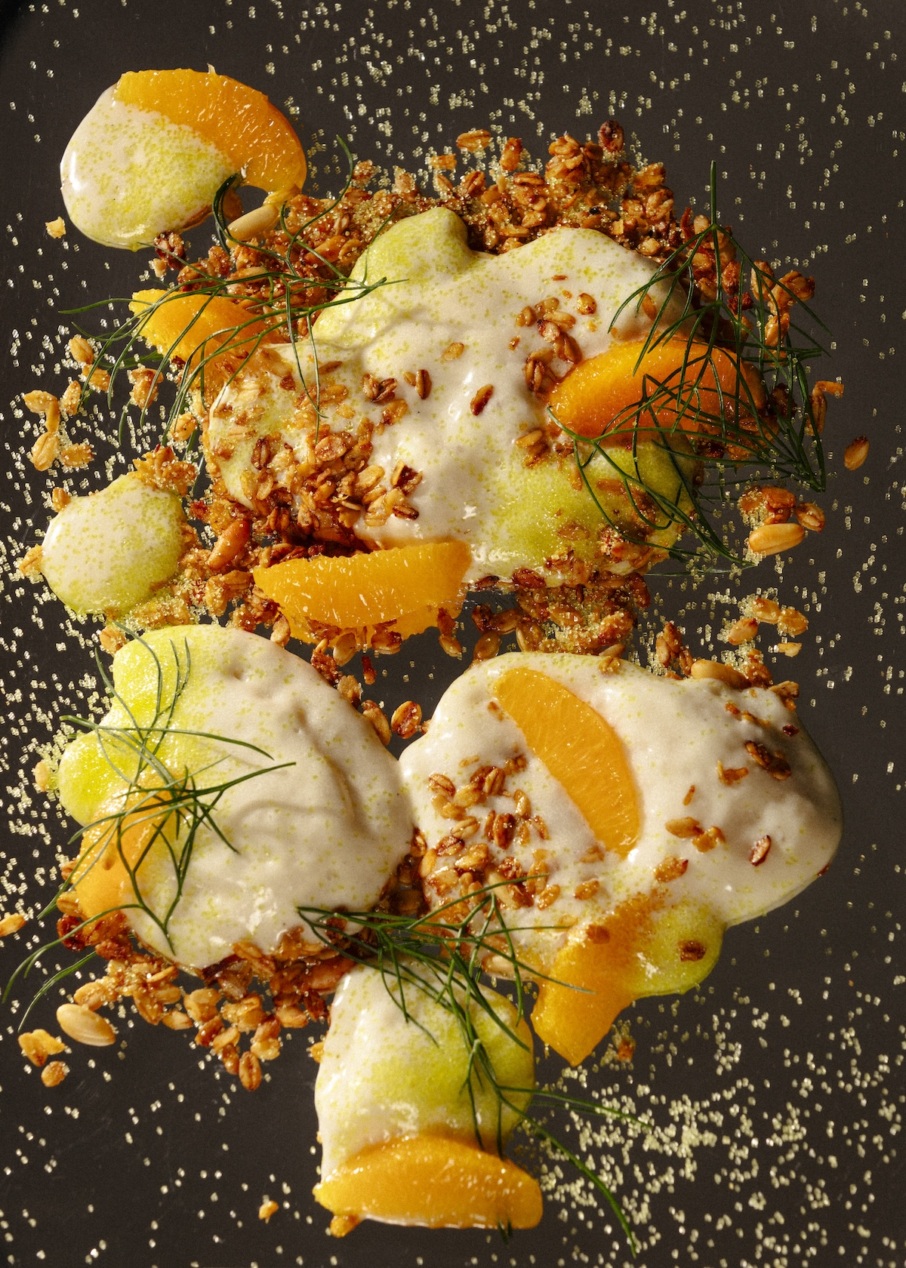
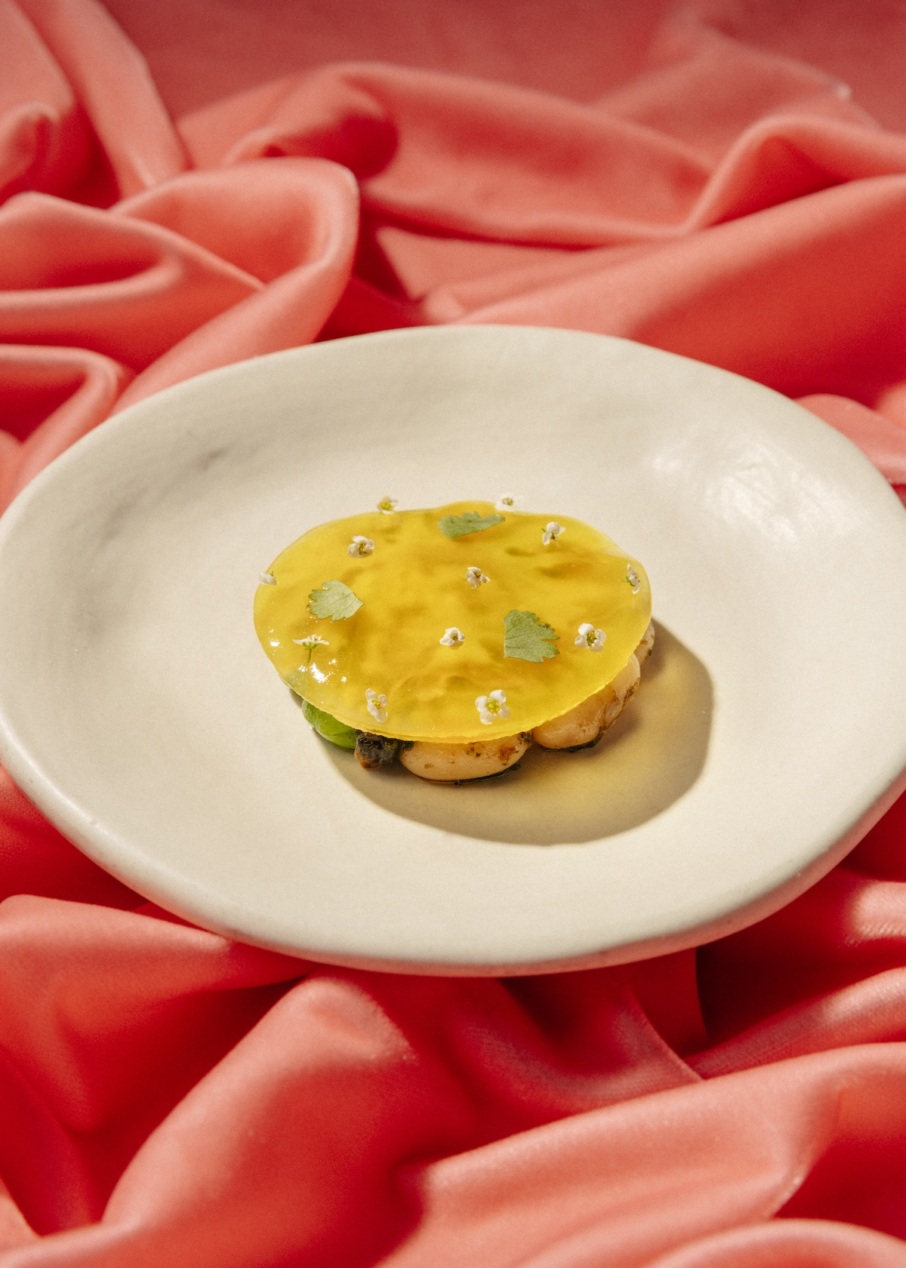
Brenda Buenviaje: I started cooking in kitchens in New Orleans in 1994, and there was no clear visibility at all. Not unless you wanted your ass kicked or to, you know, get hired at all. Back then, I was self-protective in tiers. So first, I was self-protective as a woman — it was difficult being a woman in the kitchen and being taken seriously. Then it was racism, because I’m Filipina. And then the Queer thing — I was completely closeted. Luckily, one of the biggest jobs that I landed back then was with an openly gay chef. Everything really changed for me after that; I could just be out and be comfortable.
When I moved here to San Francisco, I was 29, and San Francisco was beyond a revelation. I was like, “Holy crap. Everybody looks like me.” I’ve never felt othered in any way since I’ve moved here, and that was in ‘97. I definitely didn’t take it for granted. But you know, San Francisco is so Queer, I can’t really say that it’s improved or become more open since I’ve been here. It’s just, you know, it’s just San Francisco.
[The culinary community here] is extremely diverse. And it’s super Queer. I mean, I’m a Filipina lesbian. My director of operations is a longtime friend and is a cis gay, white man. I have trans people on staff. I have every iteration of Queer between the three restaurants. I feel proud that I’ve been able to nurture these inclusive and safe spaces.
Camille Lindsley: There have certainly been notable improvements for our community in terms of an increase in spaces that are more welcoming, [and] more accepting of Queerness; however, there is still a very long way to go.
I think the dwindling number of Queer-owned-and-operated bars, restaurants, and nightlife spaces is happening in tandem with new openings of new spaces helmed by a new generation, but I’m not sure if this amounts to a net positive. I hope that there will be a continued interest and effort from the community to keep pushing to create new spaces while honoring the lineage of the gaps left by the closing of these old institutions. I’m really in awe of what the folks at Lesbian Bar Project are doing and hope to see more community support like that for operators!

For some, Pride is [still] a battle … and I say, battle on.— Rashida Holmes, Chef and Owner, Bridgetown Roti in Los Angeles
Telly Justice: I think there’s still a lot of room for growth, especially when you throw marginal communities into it. I know, being a Queer space, we have to fight a little bit harder, and be a bit more gregarious. We have to prove ourselves more — that we know what we’re doing, and we’re capable and competent. There’s still a ways to go in building that togetherness, but it is moving in the right direction.
It’s really important to note that New York City, of all places, is probably the most competitive pressure cooker culinary scene in the country. I’ve cooked around a lot in my career, in small markets and big ones like New York. There’s so much of a competitive mindset that is inherent to a hyper-capitalistic industry: Our margins are tight, and there are tens of thousands of restaurants in the city, all vying for attention, press, praise, and accolades. And to not get swept up in that, to not feel like the other restaurants in the city are, you know, your enemies in some bleak, post-modern video game, it takes a lot of practice, and it takes a lot of patience and compassion. And you have to build that at a cultural level. I see more restaurants investing in that, lately, than I have in the past. But it’s still something that requires a lot of progress.
Sam Mink: Philadelphia, and the industry as a whole, has been a safe space for the LGBTQ+ community — even in the ‘80s when I was growing up [when my dad owned the Oyster House]. Most of his male staff, in particular, and many of his female staff, were gay, and they found a safe space in the restaurant community. And oftentimes, the people that they worked with became their family of choice, where they celebrated events. Obviously, things have changed very much since then. We now have gay marriage and many more rights and whatnot. I feel like the Queer community has found that the restaurant industry as a whole has been a very safe space, at least in Philadelphia.
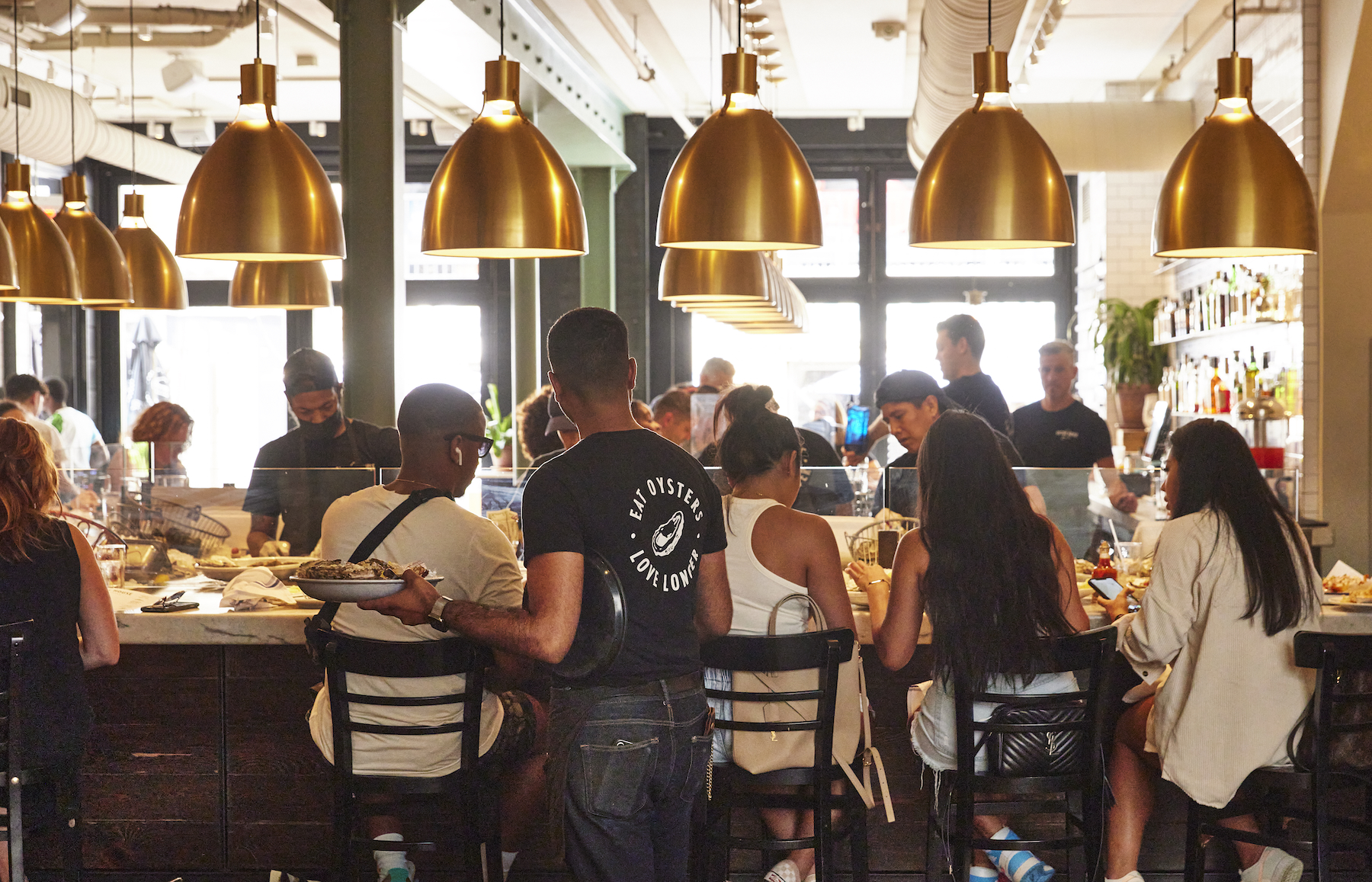
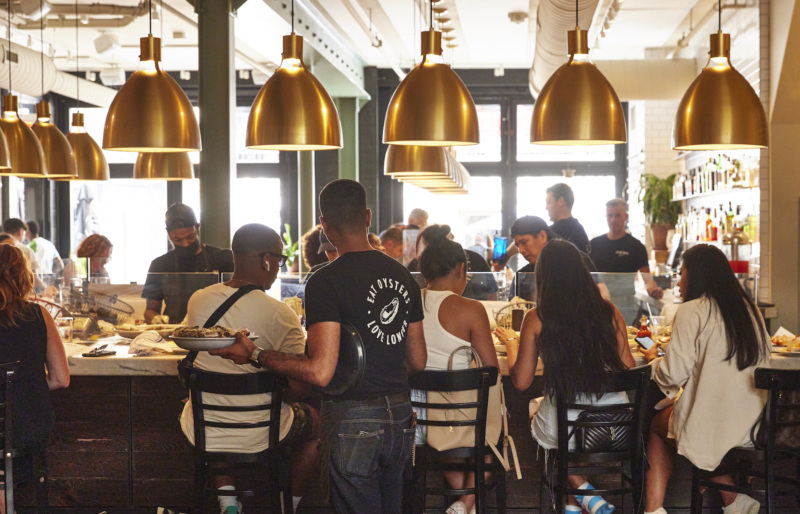
We have a very close-knit culinary community. It’s extremely supportive, very collaborative, and it seems like it’s always been that way. You hear about cities, especially like New York, and it’s very cutthroat and there’s a lot of competition. While there’s definitely a lot of competition here in Philadelphia, there is a level of “Let’s lift all of us up and work together as a community.” We saw that during COVID, especially; when times are hard, the community comes together to organize and try to lift all voices, so that everyone can benefit. People are often impressed when they come to Philadelphia — they feel that collaborative energy.
Resy: What does Pride mean to you?
Holmes: When I was young, it meant I could go party with a bunch of Queers, which was great. As I get older, I think it’s really about community; it’s about creating these large events where there’s no fear, and you can just bring and be whoever you want. I’ve lived in Los Angeles for 11 years now, and I’ve never really felt that fear of being myself in any space. But it is lovely that time of year, to just be like “Oh, wow, look, there’s just so many of us!” Look how much fun we have, look how much love there is, and look how far we’ve come.
I do feel the battle though, that this country is having, you know, but it doesn’t feel like I’m on the battlegrounds. But I also understand that it is a privilege, and that not everyone can have and celebrate Pride in that way. For some, Pride is [still] a battle … and I say, battle on.
Lindsley: I think that Pride means a lot of different things: The sense of pride and a feeling of ownership in ourselves and our identity at work, the ability to be our full selves and not feel like we have to compartmentalize or hide certain parts that feel unrelated to doing the job of cooking food, or serving wine, or taking care of guests. A big part of what HAGS is, is being able to use Queerness as a verb, and think about how we can do all the things you have to do as a restaurant, but in a Queer way. We’ve had so much fun, and we’ve experienced a lot of really interesting learning opportunities as well.
I think Pride is something that is, to use a word that feels antithetical to its definition, expansive. Pride is a lot of things. Anyone who is in our community has mixed feelings about how Pride month has become commodified — it has become an opportunity for exploitation of our community within the month — and hopes for Pride to extend beyond just June.
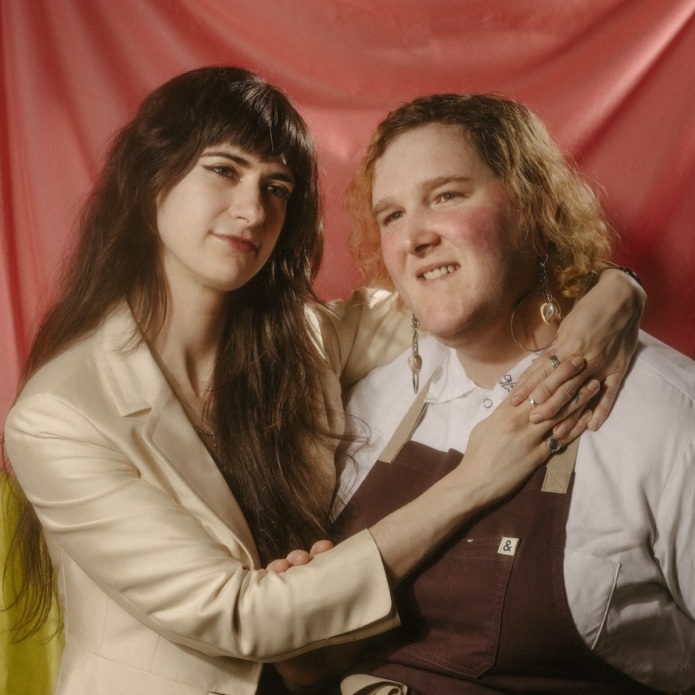
You’ll never know the experience of seeing a dining room full of people just like you until you build it. And then the community comes out, and it’s so beautiful.— Telly Justice (pictured right), Chef and Co-Owner, HAGS in New York City
Justice: Piggybacking on that, you know, the popular sound bite in the past couple of years is reminding people that Pride is and was a riot. And remembering the history and the origin of Pride and why it exists at all. I think it’s a yearly endeavor to connect yourself with the necessity of Queer community and the safety of togetherness. The fact that there was a very recent time, and even a few current moments, of fighting for human rights and human dignity and decency — having that be central to why we celebrate this, and why it’s important, and why, as it expands and becomes something more culturally a part of the zeitgeist for, you know, straight and allied individuals, it’s important to remind them that we do this to show our numbers, our strength, our pride, and without that being the beating heart of why we do this, we lose so much.
Gourdet: I really do believe Pride means, at the core, feeling very comfortable with who you are. I remember when I was coming out, it was easier for me to introduce myself as a gay man, than to go back and tell everyone who had been a part of my life that I was gay or bi. Now, I’m completely at peace with who I am. I’m very blessed to have had a supportive family, it was very easy to come out to them, but a lot of people don’t have that. For me, Pride truly means being comfortable in your skin as a Queer person. And not being ashamed of any part of you. Being proud in society, and I don’t even think you have to be loud, because I don’t think I’m the loudest Queer person, but I’m extremely comfortable with who I am.
Mink: As a privileged white man in this community, I don’t have to worry about my sexuality; that part of my identity is not a barrier at all to my business and in my ability to create a space for people. So, for me, Pride is the ability to do what I want to do, and I don’t have to be pushed back to be reminded of anything about that part of my identity; I can just continue doing what I want to do, if that makes sense. I don’t feel like there’s any barriers. For me, I don’t feel like there’s any road bumps. It’s not something that I keep quiet. It’s not something that I shy away from. I have a husband, we have a child, we are respected and very much appreciated in the community. So, it feels great that we’ve come this far. And, you know, a gay man and his husband can own a restaurant and have a child and still be an influential, positive part of the community.
Buenviaje: My flagship restaurant is right in the heart of the city, where they do the big Pride celebration. And for the longest time, a group of us would gather toward the end of the day at my restaurant, and I would have music. And it was just like a Big Gay Christmas; I don’t know how else to describe it. It’s been a little different since I have kids now. But the kids embrace it, too. It’s our day, it’s our holiday.
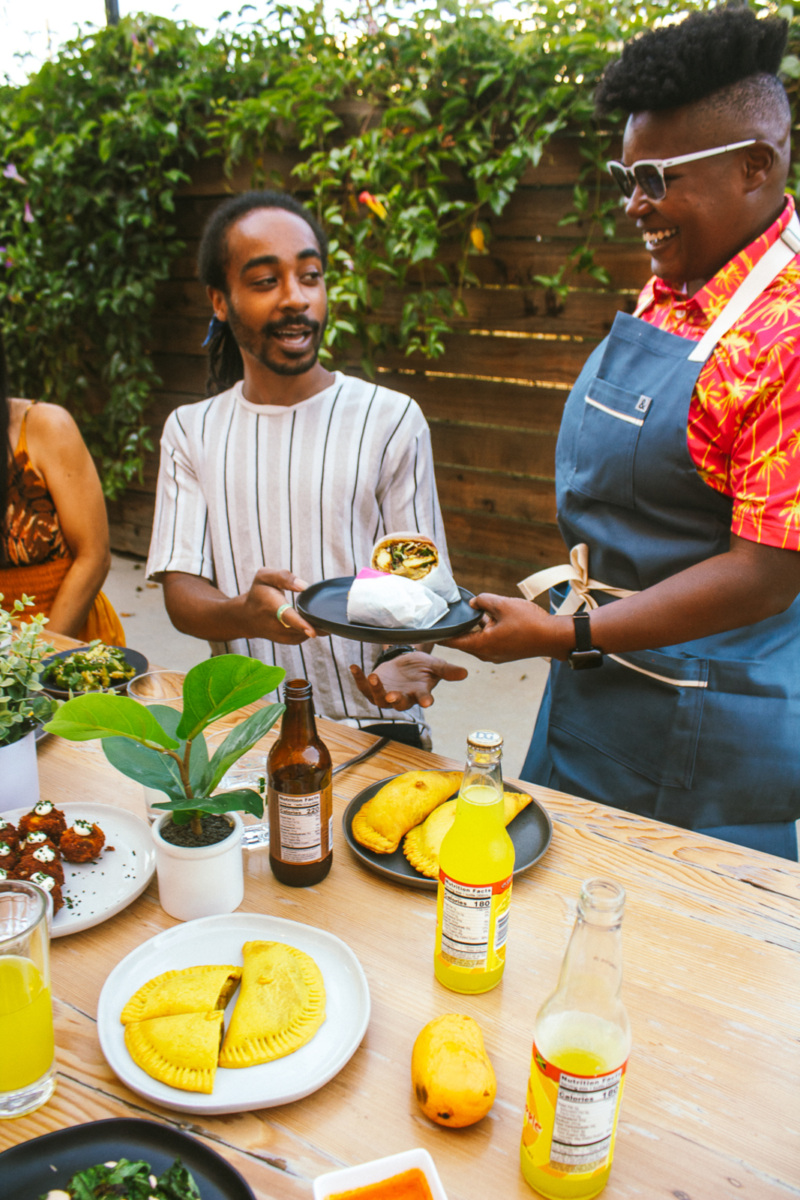

Resy: How do you plan to celebrate Pride this year?
Holmes: Opening the restaurant [Bridgetown Roti]! I think that’s an amazing way to celebrate Pride because we get to be one of the few Black- and Queer-owned restaurants in Los Angeles. I am trying to set an example, or just to be a beacon of, like, here I am in the middle of one of the big foodie cities in America, you know, just being myself. And that being myself is activism on its own.
Justice: We’re definitely closing for the Pride March, so that everybody can be a part of that; that feels very important to us. We’re a Queer business, and we’re proud and contributing to the Queer community 365 days a year. For us, Pride almost feels like, “Hey, let’s enjoy this.” This is for us. So, we’re planning little pop-ups with members of the staff, and maybe a couple of offsites with some other like-minded businesses in the area. We’re just going to enjoy the ride for the month. Last year, we did a lot of programming. It was our first Pride that we were open as a business, and I think we exhausted ourselves.
Lindsley: Why are we working so hard? This is our time — we should be chilling out, we should be the ones enjoying this. So, this year, we’re taking a different approach. We’re centering ourselves a little bit more. And that I think will, you know, encourage our Queer folks that we have the honor and privilege to feed in our dining room, the chance to let go and enjoy themselves.
Gourdet: I tend to work, I’ve actually never been to San Francisco Pride, and I would 100% love to. So, Pride will be at work. I’m so proud to have so many kinds of Queer folks on my team. We respect them, and they’re all in different positions. It just feels really comfortable, and I appreciate that. We’re kind of all intertwined into the bigger team, you know, between the two businesses. I have about 90 employees, and I would say, probably 25% of my team is Queer, if not more than that, up to 50% is some element of the alphabet, and that feels good. Pride is a time for us to kind of like, just be able to reflect, be comfortable, and confident. And to celebrate the space that we’re making for ourselves in this world.
Mink: We don’t go to the parade anymore, but that’s mostly because we usually are away for the weekend. We have a nine year-old son, so we talk about things with him, and we kind of celebrate our family and there’ll be things at his school and in the community.
Buenviaje: I’m recently divorced, so I think I’m gonna get together with friends and do another Big Gay Christmas meal at my restaurant.
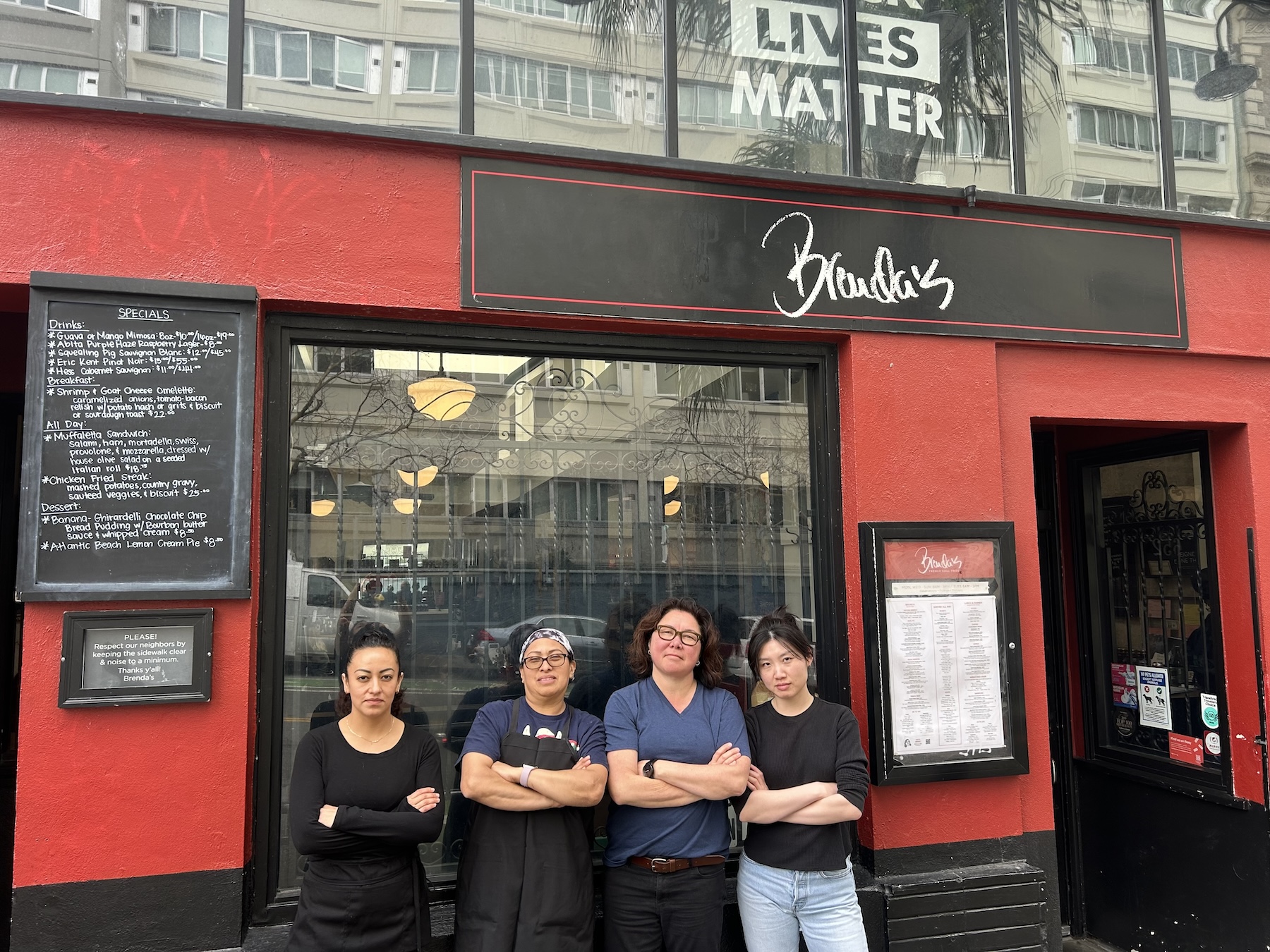
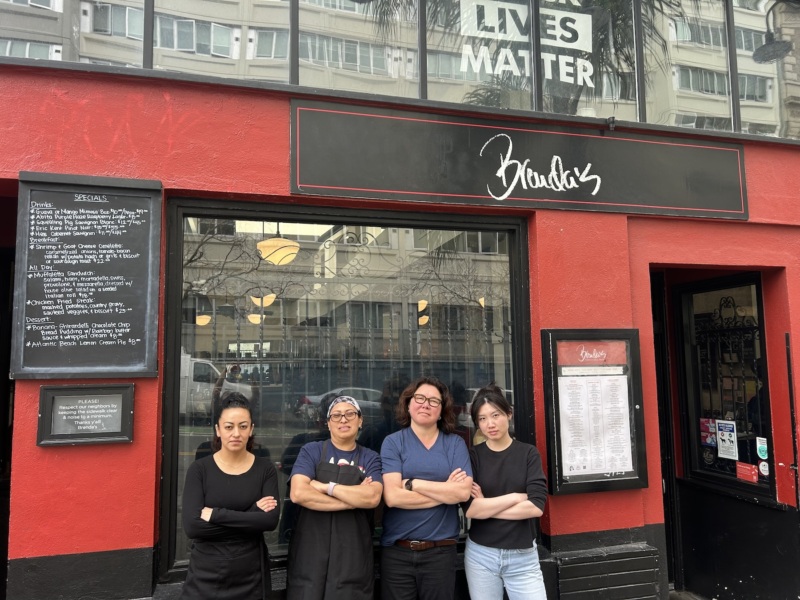
Resy: How do you make it a point to show up for your community in ways big and small?
Holmes: I am on the board of the Big Queer Food Fest, and I’m really excited about that project, to bring a fully Queer food festival to a couple of cities around the country. They’re really just trying to build something that is inclusive in every sense of the word. I really appreciate the fact that they’re taking the idea of being Queer from all different angles, and really bringing in a lot of chefs of color, and getting the spectrum of the Queer community in a really aggressive way. Because I think if you’re not aggressively trying to be diverse, then you won’t be; it has to be a choice, it has to be directed.
My No. 1 activism is just to be me and be out and never shy away from who I am. And to never shy away from the kind of space I want to create. It’s interesting because the Caribbean isn’t necessarily the most progressive when it comes to Queer issues and identity. So being a Queer Caribbean chef is also activism all on its own. To represent the Caribbean community and also be Queer is rebellious. So if I’m able to be a representative of my island heritage, and then also be Queer, that part is really important to me.
Gourdet: Pride is year-round; speaking up for marginalized groups within our Queer communities is extremely important to us, donating to organizations that support issues, and just being supportive of my friends who are doing good work. The James Beard Awards are [coming up], and there’s a Pride event there for all the Queer chefs who are nominated. It’s finding all these little nooks. It’s extremely important to acknowledge us and to make sure that we’re doing the right thing and taking our space.
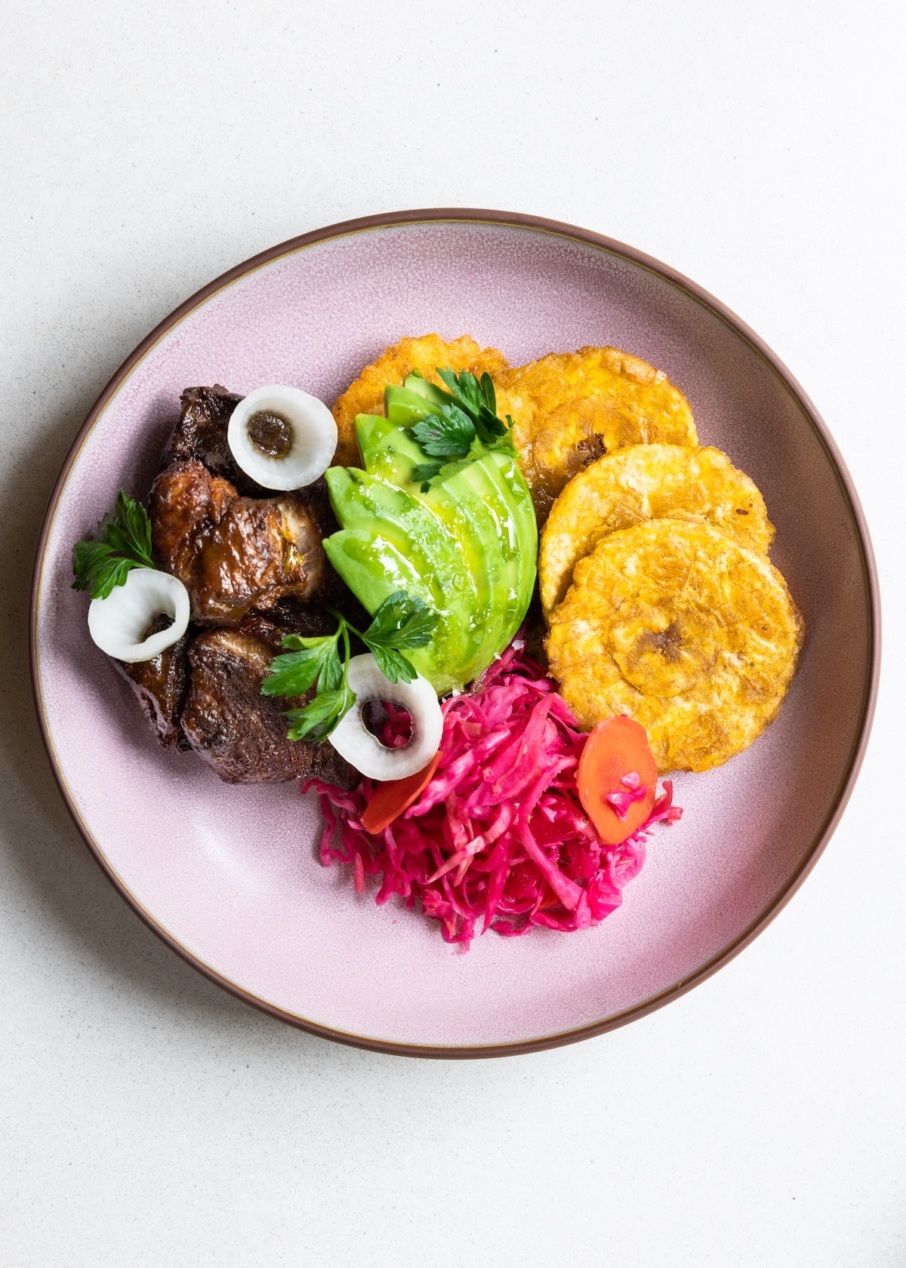
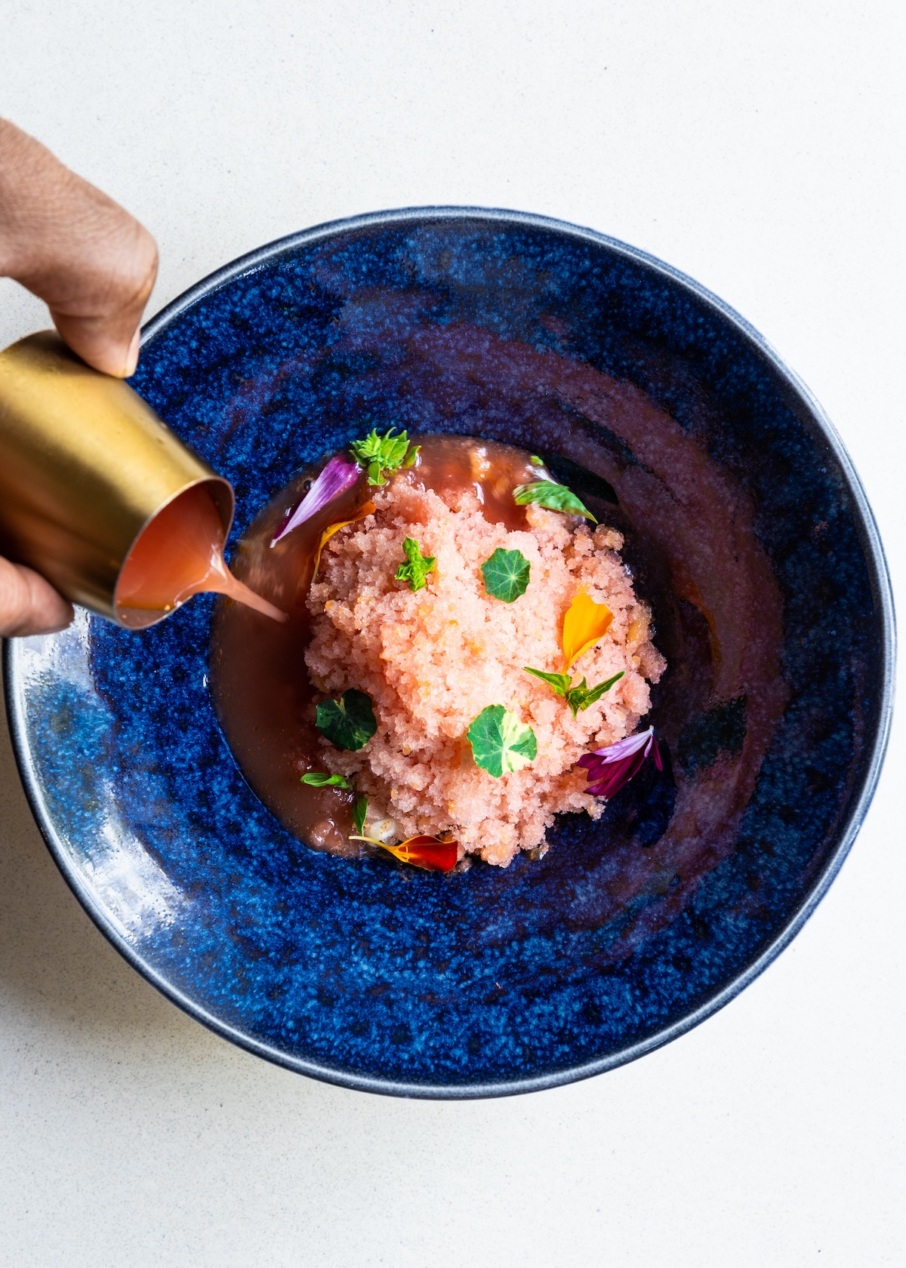
Mink: The Attic Youth Center is a LGBTQ+ organization in Philadelphia, the only one of its kind in the city, and one of the first in the nation [it’s over 25 years old]. I was on the board for seven years, and we provide food, a lot of assistance financially, as well as internships. As far as any specific celebrations at the restaurant, we don’t have anything planned for Pride. We actually [had] our Pride weekend on Sunday, June 2, and have our second annual shuck fest event, which is a big oyster festival that we put down by the water. It’s the city’s largest oyster festival, then afterwards, our staff — gay and straight — including myself, we usually will go out and celebrate and join in the Pride festivities somewhere in a city.
Lindsley: For our Sunday service, we have a sliding scale brunch every week. That’s our day to let our hair down, have a bit more of a casual fun time, and invite people in the community who may want to check us out before splurging for the whole tasting menu. We used to host a lot of pop-ups on Sunday evenings but since pivoting to brunch, we haven’t hosted quite as many guests.
On June 23, we will be hosting an event after Sunday brunch, in benefit of Co-Fermented, a nonprofit organization to help Queer people of color in the beverage — specifically the wine industry — access education, make connections, and form a community. It was founded and run by our assistant general manager, Oniyx Acosta. They are so talented. They have been on our team for a year and have been promoted to management recently, and are doing an awesome job. We’re kind of letting them do what they want on the 23rd; they have selected a lot of Queer-made wines to pour. We’re really excited to host someone who is so near and dear to us, who has a really exciting, visionary nonprofit that they’re running.
Buenviaje: I’m running some Pride specials at my flagship restaurant. That’s as far as I’ve gotten because I just am wrapping up AAPI Heritage Month; I have so many reasons to celebrate. I am not an extroverted person, but I will show up or be the face of, or do an interview, just to be an example of someone who’s succeeding within the community. And I contribute in multiple ways, a lot of times just by virtue of supporting Queer organizations or showing up for Queer events, even at my kids’ schools.
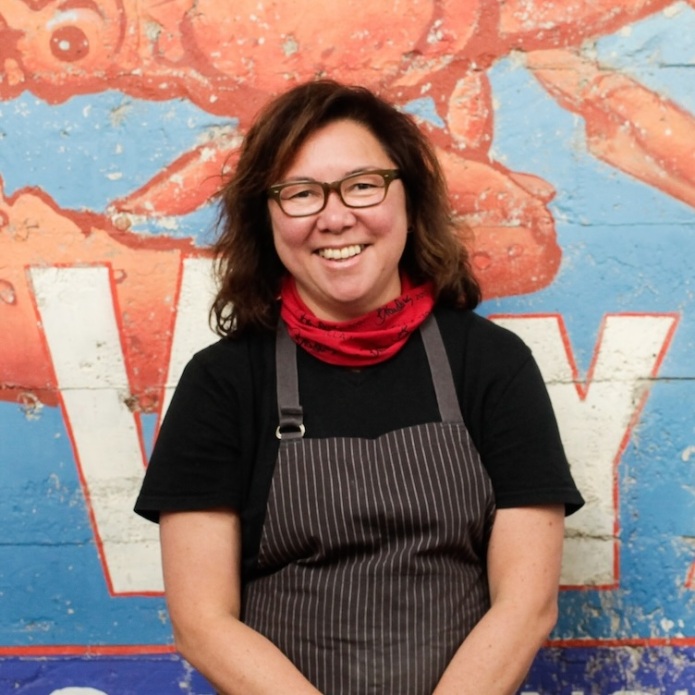
I have every iteration of Queer between the three restaurants. I feel proud that I’ve been able to nurture these inclusive and safe spaces.— Brenda Buenviaje, Chef and Owner, Brenda’s French Soul Food, Brenda’s Meat & Three, and Brenda’s Oakland
Resy: Was there a time recently where you felt like you had a “Pride moment”?
Holmes: You know, I actually feel Pride every time I’m with my son. I have an 18-month-old. And I just get really excited for him to be growing up in this loving household, where he won’t be judged for whoever he is, by anyone, including both sets of his grandparents. And that’s not something that a lot of people have. It was a journey for us all to get here but it’s pretty remarkable that he has two loving moms. He has three loving, living grandparents — all of that love, unconditional. I know that he’s gonna grow up with no fear of being who he is. And that, I think, brings me the most pride. I mean, he’s going to struggle; he’s a dark skinned young Black boy and the world will give him trouble because that’s the America that we live in. But I know that none of that is gonna come from anyone in his family. And that’s pretty great.
Mink: This may sound cheesy, but being a proud husband and father. Every time we go to my son’s school to read books for his birthday, because that’s how they celebrate birthdays, the kids get so excited. They’re like “Oh, Asher, your dads are here!” They get very excited that he has two dads. So that is something that I love; it makes me feel so proud inside. And it’s just a great moment in my life, when we walk in [to Asher’s school], and we’re very much part of that community and celebrated for who we are.
Gourdet: We just promoted a [Queer] teammate to a lead position. He’s wanted to become a professional server, and he came to us from more of a casual space that actually has a drive-in. And right off the bat, he was excellent. And he’s done his way around all the positions on the floor. And just last week, we promoted him to lead. That representation is extremely important. He also happens to be a person of color. Moments like that are really, really special. And, you know, I look forward to working with him and trusting him and just trusting him with the restaurant even more in his new position.
Buenviaje: I have three kids and they’re all straight. My youngest [he’s eight], had a Pride parade at school. And he expressed to me how extremely important it was, that I be there for it, because those things are optional. And a lot of times, parents don’t go; it’s really for the kids. I realized that it was important to him because it’s part of his identity. And I was just so proud of him. Like, oh, my God, really, I forget with all the other stuff going on that the Queer community is a central part of my three heterosexual children’s lives.
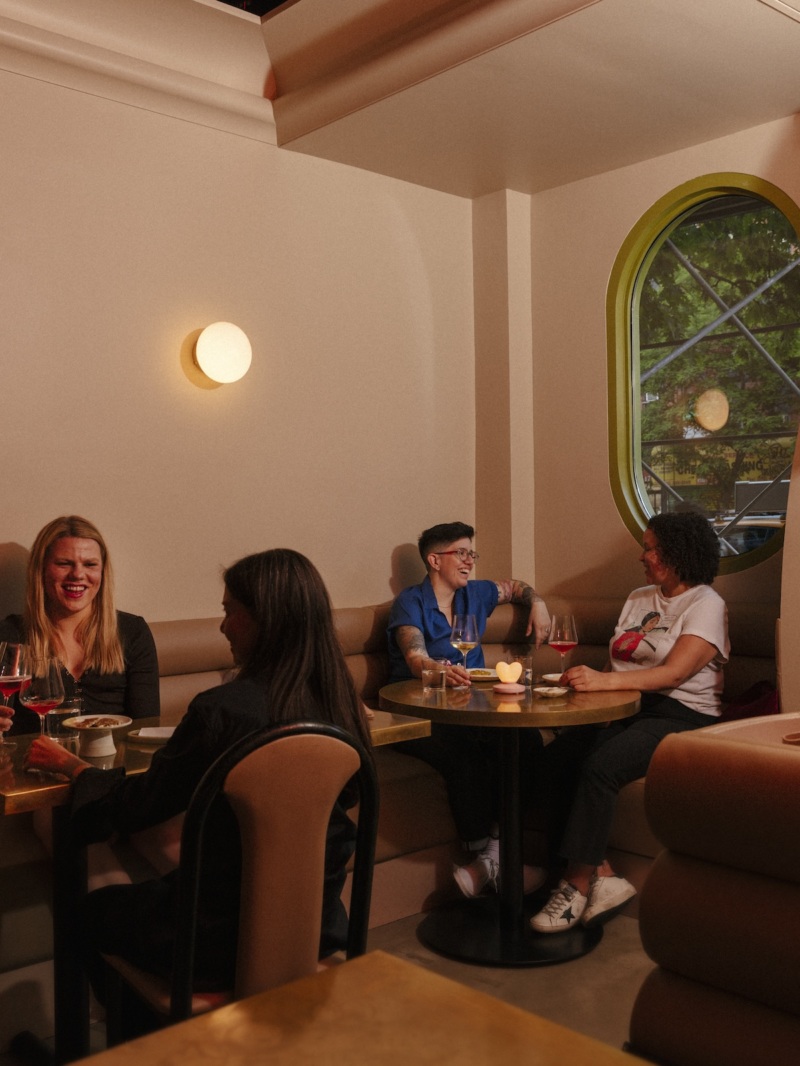

Justice: HAGS is a uniquely overtly Queer concept. So, we have a lot of those moments periodically, week to week, day to day, and I’ll speak to an example that we experienced [recently]. Sorry, I’m getting emotional.
Lindsley: We have this incredibly awesome badass couple who are longtime regulars [at HAGS]: a really awesome trans lesbian couple who came out later in life and have been so incredibly supportive of us. One of them runs or helps a support group for partners of trans women who are coming out. Last night, they brought in a couple who have a somewhat similar story, where one of the partners came out as trans later in life. They hadn’t seen each other since transitioning, and this was their first dinner together.
Justice: Being a forum to host those kinds of meals is deeply, deeply touching. It’s really incredible. Having had the career experiences that I’ve had as a trans woman, being able to look in the dining room and see happy, thriving, older trans women, it’s just very touching. It feels very special to get to feed people that you want to feed. It’s important. That is what community is. So, we get a lot of those experiences; we’re very lucky to. I feel that pride in almost every aspect of what we do in this business, which is why I think it’s so important to have quintessentially and overtly Queer voices and recognize Queer faces in food and beverage. You’ll never know the experience of seeing a dining room full of people just like you until you build it. And then the community comes out, and it’s so beautiful.
Amanda Celestino is a New York-based writer and a board member of the Queer Food Foundation.








